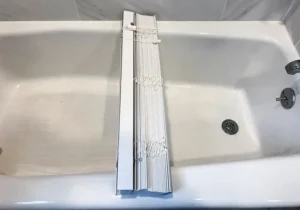Glass shower doors add a sleek and modern look to your bathroom, but they can quickly become cloudy and streaked due to hard water stains. These stains are caused by the buildup of minerals like calcium and magnesium, which are left behind when water evaporates on the glass surface.
Over time, this can create stubborn spots and make your shower door look less attractive. Cleaning glass shower doors with hard water stains can seem like a daunting task, but with the right methods and materials, it’s completely manageable.
In this guide, we’ll walk you through various safe and effective ways to clean hard water stains from your shower door.
Whether you prefer using household items or commercial cleaners, this step-by-step approach will help you restore the shine to your glass and maintain a clean, fresh look in your bathroom.
Understanding Hard Water Stains on Glass Shower Doors
Before diving into cleaning methods, it’s helpful to understand what hard water stains are and why they form. Hard water contains high levels of dissolved minerals, primarily calcium and magnesium.
When hard water evaporates from the surface of a glass shower door, these minerals are left behind, creating cloudy stains and deposits. Over time, if not cleaned regularly, these stains can become more difficult to remove, leaving an unsightly appearance on your glass.
Hard water stains are not permanent, but they do require special attention and the right cleaning products or techniques to remove effectively. Regular cleaning can help prevent buildup, but for existing stains, more intensive methods are often necessary.
Tools and Supplies You’ll Need
To clean your glass shower door effectively, you’ll need a few essential tools and materials. These can either be store-bought cleaning products or everyday household items. Here’s a list of the supplies you may need:
- Microfiber cloth or soft sponge
- White vinegar
- Baking soda
- Lemon juice
- Commercial glass cleaner (optional)
- Squeegee
- Spray bottle
- Water
- Old toothbrush (for scrubbing hard-to-reach areas)
- Rubber gloves (to protect your hands)
Once you have these items ready, you can begin the cleaning process.
Method 1: Using White Vinegar
One of the simplest and most effective methods to remove hard water stains is by using white vinegar. Its acidic properties help break down mineral deposits, making it an excellent natural cleaner.
Steps:
- Prepare a Vinegar Solution: Mix equal parts of white vinegar and water in a spray bottle. Warm the vinegar slightly in the microwave to enhance its cleaning power.
- Spray the Solution on the Glass: Generously spray the vinegar solution onto the glass shower door, ensuring that all stained areas are covered. Let it sit for at least 10-15 minutes to allow the vinegar to dissolve the hard water deposits.
- Scrub with a Sponge or Cloth: After the solution has had time to work, use a soft sponge or microfiber cloth to scrub the glass gently. Focus on the areas with the heaviest stains.
- Rinse and Dry: Rinse the glass with clean water to remove the vinegar and dissolved minerals. Use a squeegee or a clean microfiber cloth to wipe the glass dry and prevent new water spots from forming.
- Repeat if Necessary: For tough stains, you may need to repeat the process or leave the vinegar on for a longer period.
Method 2: Using Baking Soda and Vinegar Paste
For particularly stubborn hard water stains, a baking soda and vinegar paste can offer more scrubbing power. Baking soda acts as a gentle abrasive, helping to remove mineral buildup without scratching the glass.
Steps:
- Make a Paste: In a small bowl, mix baking soda with just enough white vinegar to create a thick paste. The mixture will fizz initially as the ingredients react, which helps loosen the stains.
- Apply the Paste to the Stains: Use a soft sponge or cloth to apply the baking soda paste to the stained areas of the glass. Ensure an even coating over the toughest spots.
- Let it Sit: Allow the paste to sit on the glass for 10-15 minutes to give it time to work on the mineral deposits.
- Scrub and Rinse: After the paste has had time to work, gently scrub the glass with a microfiber cloth or sponge. Be sure to rinse the glass thoroughly with clean water afterward.
- Dry the Glass: Use a squeegee or microfiber cloth to dry the glass and prevent streaks or new stains.
Method 3: Lemon Juice for a Natural Shine
Lemon juice is another natural cleaning solution that can effectively remove hard water stains. The citric acid in lemon juice helps to break down the mineral deposits, and it also leaves a fresh scent.
Steps:
- Cut a Lemon in Half: Squeeze the juice from a fresh lemon into a bowl or apply the lemon halves directly to the glass.
- Rub the Lemon on the Glass: Use the lemon halves to rub the juice directly onto the stained areas of the glass. The natural acid will work to dissolve the hard water stains.
- Let it Sit: Allow the lemon juice to sit on the glass for about 5-10 minutes to break down the deposits.
- Rinse and Wipe Dry: Rinse the glass with clean water and use a squeegee or microfiber cloth to dry it thoroughly.
Method 4: Commercial Glass Cleaners
If natural solutions aren’t doing the trick, there are several commercial glass cleaners available that are specifically designed to tackle hard water stains. These cleaners contain chemicals that dissolve mineral deposits quickly and effectively.
Steps:
- Choose a Suitable Cleaner: Look for a glass cleaner that is specifically formulated to remove hard water stains. Popular brands often include ingredients that break down calcium and magnesium deposits.
- Follow the Product Instructions: Apply the cleaner to the glass according to the manufacturer’s instructions. This often involves spraying the cleaner directly onto the stained areas.
- Scrub with a Soft Cloth: After letting the cleaner sit for the recommended amount of time, use a microfiber cloth or sponge to scrub the glass.
- Rinse and Dry: Rinse the glass with water to remove any residue, and wipe it dry to avoid streaks or water spots.
Method 5: Prevention and Maintenance Tips
Once you’ve cleaned your shower door and removed the hard water stains, maintaining a clean and clear surface becomes essential. Here are some helpful tips for preventing future buildup:
- Use a Squeegee After Every Shower: One of the easiest ways to prevent hard water stains is to use a squeegee to remove water from the glass after every shower. This prevents water from evaporating and leaving behind mineral deposits.
- Apply a Water Repellent Coating: Products like Rain-X or other water-repellent coatings can help protect your glass from water spots. These products make water bead up and roll off the surface, reducing the chance of stains.
- Regular Cleaning: Make a habit of cleaning your glass shower door regularly, even if there are no visible stains. A quick weekly wipe-down with a vinegar solution or glass cleaner can help keep the glass clear and prevent mineral buildup.
- Soften Your Water: If hard water is a persistent problem, consider installing a water softener in your home. Water softeners remove calcium and magnesium from your water supply, which can prevent stains on glass and other surfaces.
Troubleshooting Common Issues
Despite your best efforts, you may encounter challenges when cleaning hard water stains. Here are some common issues and how to address them:
- Tough Stains That Won’t Budge: For extremely tough stains, you may need to repeat the cleaning process multiple times or leave the cleaning solution on the glass for a longer period.
- Avoid Scratching the Glass: When scrubbing, always use soft materials like microfiber cloths or non-abrasive sponges. Harsh scrubbing pads or brushes can scratch the glass and cause permanent damage.
- Water Spots Returning Quickly: If water spots keep reappearing, consider applying a water repellent product to your glass after cleaning. This will help prevent water from sticking to the surface.
When to Seek Professional Help
In some cases, especially if hard water stains have been left to accumulate for a long time, professional cleaning services may be necessary. If your shower door has severe staining that you can’t remove on your own, a professional cleaner with specialized tools and products may be able to restore the glass.
Professional cleaning is also a good option if you want to ensure your glass doors are completely spotless for a special occasion, such as moving into a new home or hosting guests.
Conclusion
Cleaning glass shower doors with hard water stains doesn’t have to be a difficult or frustrating task. With the right techniques and products—whether natural or commercial—you can easily restore the clarity of your glass and maintain a clean, inviting bathroom. Regular maintenance, such as wiping down the glass after each shower and applying a protective coating, can help prevent future stains from forming. By staying proactive and using the methods outlined in this guide, you can enjoy a sparkling clean shower door that enhances the overall appearance of your bathroom.




